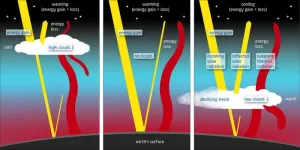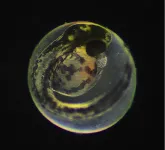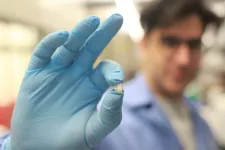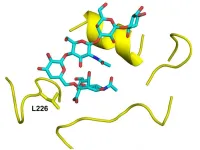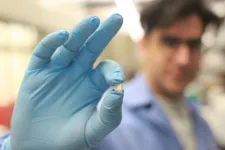(Press-News.org) More information, including a copy of the paper, can be found online at the Science press package at https://www.eurekalert.org/press/scipak.
Engineered Immune Cells May Be Able to Tame Inflammation
Immune cells that are designed to soothe could improve treatment for organ transplants, type 1 diabetes and other autoimmune conditions.
When the immune system overreacts and starts attacking the body, the only option may be to shut the entire system down and risk developing infections or cancer.
But now, scientists at UC San Francisco may have found a more precise way to dial the immune system down.
The technology uses engineered T cells that act as immune “referees” to soothe overreacting immune responses. They also can mop up inflammatory molecules.
The new approach could be used to stop the body from rejecting transplanted organs and tissues, such as pancreatic islet cells, which are sometimes used to treat type 1 diabetes. That way, recipients would not need to take harsh immunosuppressant drugs.
“This technology can put the immune system back into balance,” said Wendell Lim, PhD, UCSF professor of cellular and molecular pharmacology and co-senior author of the paper, which appears Dec. 5 in Science. “We see it as a potential platform for tackling all kinds of immune dysfunction."
Lim and his colleagues were inspired by “suppressor” cells, which are the immune system’s natural brakes. They wanted to take advantage of these suppressor cells’ power to temper immune responses, such as inflammation.
Unfortunately, suppressor cells can’t always stop a dangerous immune response. In type 1 diabetes, for example, the immune system destroys pancreatic islet cells, while these suppressor cells just stand by.
The team adapted the suppressor cells’ anti-inflammatory abilities to work in CD4 immune cells. These are the same cells that are used to make cancer-killing CAR T cells. They also gave these cells a molecular sensor to guide them to their target tissue in the body.
Proof of principle in type 1 diabetes
The scientists tailored a batch of immune referees to search for human pancreatic islet cells and then produce TGF-Beta and CD25, molecules that can muzzle killer T cells.
They introduced the engineered referee cells into mice that had received a transplant of human islet cells, modeling the treatment for type 1 diabetes.
The referee cells found the vulnerable islet cells and stopped the killer T cells from attacking, and the islet cells survived.
“It would be life changing for people with type 1 diabetes if they could get new islet cells without needing to take immunosuppressants, and stop having to take insulin every day,” said Audrey Parent, PhD, associate professor in the UCSF Diabetes Center and a co-senior author of the paper.
Lim envisions a future in which organ transplant patients, or those with autoimmune diseases, receive therapies that only treat the specific regions of the body where the immune system is misbehaving.
This could prevent the significant side effects from general immunosuppressants as well as the infections and cancers that arise when the immune system is disabled completely.
The new technology also could be used to finetune CAR T cell therapies for cancer, so these CAR T cells only attack tumors, and not healthy tissue.
“This puts so many more options on the table for dealing with some of the biggest challenges in medicine,” said Lim, who directs the UCSF Cell Design Institute. “We hope this can benefit patients in the not-so-distant future.”
Authors: In addition to Lim and Parent, other UCSF authors include Hasna Maachi, PhD, MSc, Yini Xiao, PhD, Milos S. Simic, PhD, Wei Yu, MD, PhD, Yurie Tonai, Daniela A. Cabanillas, MS, Ella Serrano-Wu, Philip T. Pauerstein, MD, PhD, Whitney Tamaki, Greg M. Allen, MD, PhD, , as well as Nishith R. Reddy, PhD, now at Massachusetts Institute of Technology, and co-senior author, Matthias Hebrok, PhD, the former director of the UCSF Diabetes Center who is now at Technical University Munich in Germany.
Funding and disclosures: This work was supported by grants from the National Institutes of Health and the National Institute of Diabetes and Digestive and Kidney Diseases, including R01CA258789, R01DK132547, and UC4DK116264. For all funding and disclosures see the paper.
About UCSF: The University of California, San Francisco (UCSF) is exclusively focused on the health sciences and is dedicated to promoting health worldwide through advanced biomedical research, graduate-level education in the life sciences and health professions, and excellence in patient care. UCSF Health, which serves as UCSF's primary academic medical center, includes top-ranked specialty hospitals and other clinical programs, and has affiliations throughout the Bay Area. UCSF School of Medicine also has a regional campus in Fresno. Learn more at ucsf.edu, or see our Fact Sheet.
###
Follow UCSF
ucsf.edu | Facebook.com/ucsf | YouTube.com/ucsf
END
Engineered immune cells may be able to tame inflammation
Immune cells that are designed to soothe could improve treatment for organ transplants, type 1 diabetes and other autoimmune conditions.
2024-12-05
ELSE PRESS RELEASES FROM THIS DATE:
Rapid surge in global warming mainly due to reduced planetary albedo
2024-12-05
Rising sea levels, melting glaciers, heatwaves at sea – 2023 set a number of alarming new records. The global mean temperature also rose to nearly 1.5 degrees above the preindustrial level, another record. Seeking to identify the causes of this sudden rise has proven a challenge for researchers. After all, factoring in the effects of anthropogenic influences like the accumulation of greenhouse gases in the atmosphere, of the weather phenomenon El Niño, and of natural events like volcanic eruptions, can account for a major portion of the warming. But doing so still leaves a gap of roughly 0.2 degrees Celsius, which has never been satisfactorily ...
Single mutation in bovine H5N1 switches viral binding specificity to human receptors
2024-12-05
A single mutation in bovine influenza H5N1 – a clade of the highly pathogenic avian influenza virus that has been increasingly detected among North American livestock herds – can cause the virus to switch affinity from animal-type receptors to human-type receptors, according to a new study. The findings highlight the crucial need for continuous surveillance of emerging H5N1 mutations, as even subtle genetic changes could increase the virus's capacity for human adaptation and transmission, potentially triggering a future influenza pandemic. In 2021, the highly pathogenic influenza H5N1 clade ...
Discovered: the neuroendocrine circuit that dictates when fish are ready to hatch
2024-12-05
Researchers have uncovered a previously unknown yet crucial role for thyrotropin-releasing hormone (Trh) in zebrafish hatching and reveal how this hormone activates a transient neuroendocrine circuit that controls when fish larvae are ready to leave the egg and swim free. For egg-born animals, hatching marks a pivotal shift, transitioning from the sheltered environment of an egg capsule to external conditions. This crucial event is not strictly hardwired into the embryo’s developmental program. Rather, hatching is a regulated ...
Climate change threatens global biodiversity, with extinction risks escalating at higher temperatures
2024-12-05
Climate change is driving global extinction risks, with 1.6% of species threatened at 1.3°C of warming and risks escalating to 29.7% at 5.4°C, according to a new meta-analysis encompassing more than 30 years of research. Climate change is reshaping ecosystems and biodiversity globally, altering species distributions, interactions, and population dynamics. While some species adapt or migrate to track shifting climates, others face population declines, shrinking ranges, and potential extinction. ...
Scientists ‘turn up the heat’ on understanding coffee wilt disease which threatens our favourite daily brew
2024-12-05
Scientists, including those from Imperial College London, University of Oxford and CABI, have ‘turned up the heat’ on how repeated outbreaks of coffee wilt disease threatened arabica and robusta varieties of our favourite daily coffee brew.
The scientists, who present their findings in the journal PLoS Biology, say the fungal pathogen Fusarium xylarioides continues to pose a significant threat to coffee production and incomes across sub-Saharan Africa.
Their work supports earlier findings, based on DNA markers and crossing experiments which suggested that F. xylarioides is ...
Researchers crack the code of how fish pick their own birthday
2024-12-05
New research has revealed that fish embryos actively control their hatching timing through a neurohormone, Thyrotropin-Releasing Hormone (TRH), which triggers the release of enzymes that dissolve the egg wall. This groundbreaking discovery uncovers a previously unknown neural mechanism that governs a critical life-stage transition, showing that embryos are not passive but instead actively make life-or-death decisions. The finding has significant evolutionary implications, offering new insights into neurobiology, survival strategies, and environmental adaptation in vertebrates.
Dr. ...
Shaking sensor continuously monitors inflammation
2024-12-05
Northwestern University scientists have designed a new implantable device that can monitor fluctuating levels of proteins within the body in real time.
Inspired by fruit shaking off the branches of a tree, the device comprises strands of DNA that stick to proteins, shake them off and then grab more proteins. This creative strategy enables the device to sample various proteins over time to measure changes in inflammatory markers.
In proof-of-concept experiments, the sensors accurately and sensitively measured protein biomarkers of inflammation in diabetic rats. ...
Scripps Research scientists identify mutation that could facilitate H5N1 “bird flu” virus infection and potential transmission in humans
2024-12-05
LA JOLLA, CA—Avian influenza viruses typically require several mutations to adapt and spread among humans, but what happens when just one change can increase the risk of becoming a pandemic virus? A recent study led by scientists at Scripps Research reveals that a single mutation in the H5N1 “bird flu” virus that has recently infected dairy cows in the U.S. could enhance the virus’ ability to attach to human cells, potentially increasing the risk of passing from person to person. The findings—published in ...
Queen Mary University of London vaccination tool boosts uptake of MMR vaccine in children
2024-12-05
A software tool developed by Queen Mary University of London’s Clinical Effectiveness Group (CEG) and used as part of a facilitated quality improvement programme has increased the number of children receiving their first MMR vaccination on time in North East London. The success of this programme highlights the potential of a learning health system and data-driven solutions to enhance public health and improve vaccination uptake across the UK.
An evaluation published in Vaccine revealed that the APL-Imms ...
Implantable sensors unlock ability to continuously monitor inflammation
2024-12-05
Implantable Sensors Unlock Ability to Continuously Monitor Inflammation
The Chan Zuckerberg Biohub Chicago’s milestone achievement tracks protein levels in real time, enabling monitoring of inflammation at the cellular level
Proteins are the building blocks of life, and changes in protein levels can indicate improving health or impending illness, including signs of inflammation. While protein levels can be measured in periodic blood or urine tests, it has been an uphill challenge to figure out how to continuously monitor protein levels in the human body in real time.
Now, a team of bioengineers at Chan Zuckerberg Biohub Chicago, supported by the ...
LAST 30 PRESS RELEASES:
Striking genomic architecture discovered in embryonic reproductive cells before they start developing into sperm and eggs
Screening improves early detection of colorectal cancer
New data on spontaneous coronary artery dissection (SCAD) – a common cause of heart attacks in younger women
How root growth is stimulated by nitrate: Researchers decipher signalling chain
Scientists reveal our best- and worst-case scenarios for a warming Antarctica
Cleaner fish show intelligence typical of mammals
AABNet and partners launch landmark guide on the conservation of African livestock genetic resources and sustainable breeding strategies
Produce hydrogen and oxygen simultaneously from a single atom! Achieve carbon neutrality with an 'All-in-one' single-atom water electrolysis catalyst
Sleep loss linked to higher atrial fibrillation risk in working-age adults
Visible light-driven deracemization of α-aryl ketones synergistically catalyzed by thiophenols and chiral phosphoric acid
Most AI bots lack basic safety disclosures, study finds
How competitive gaming on discord fosters social connections
CU Anschutz School of Medicine receives best ranking in NIH funding in 20 years
Mayo Clinic opens patient information office in Cayman Islands
Phonon lasers unlock ultrabroadband acoustic frequency combs
Babies with an increased likelihood of autism may struggle to settle into deep, restorative sleep, according to a new study from the University of East Anglia.
National Reactor Innovation Center opens Molten Salt Thermophysical Examination Capability at INL
International Progressive MS Alliance awards €6.9 million to three studies researching therapies to address common symptoms of progressive MS
Can your soil’s color predict its health?
Biochar nanomaterials could transform medicine, energy, and climate solutions
Turning waste into power: scientists convert discarded phone batteries and industrial lignin into high-performance sodium battery materials
PhD student maps mysterious upper atmosphere of Uranus for the first time
Idaho National Laboratory to accelerate nuclear energy deployment with NVIDIA AI through the Genesis Mission
Blood test could help guide treatment decisions in germ cell tumors
New ‘scimitar-crested’ Spinosaurus species discovered in the central Sahara
“Cyborg” pancreatic organoids can monitor the maturation of islet cells
Technique to extract concepts from AI models can help steer and monitor model outputs
Study clarifies the cancer genome in domestic cats
Crested Spinosaurus fossil was aquatic, but lived 1,000 kilometers from the Tethys Sea
MULTI-evolve: Rapid evolution of complex multi-mutant proteins
[Press-News.org] Engineered immune cells may be able to tame inflammationImmune cells that are designed to soothe could improve treatment for organ transplants, type 1 diabetes and other autoimmune conditions.
